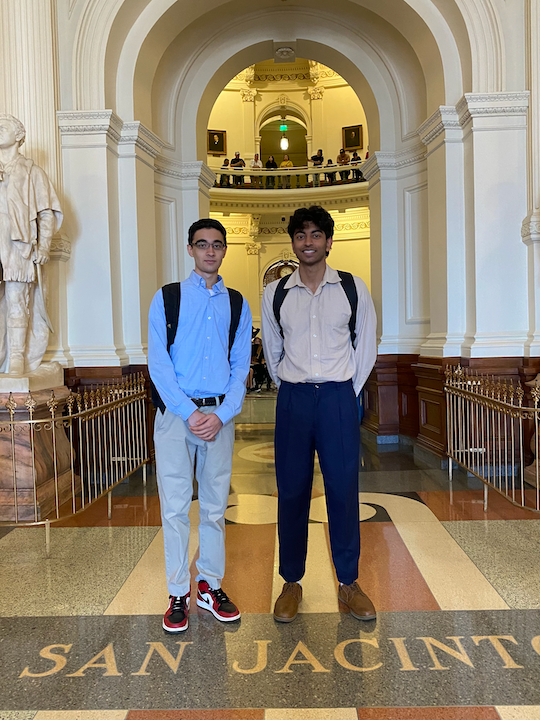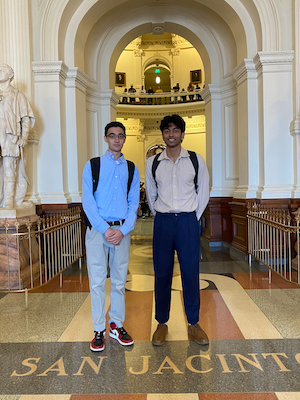As a sophomore, Shonik Ganjoo (Lovett ’24) reached out to the leadership at Doctors for Change, a nonprofit that supports equitable access to health care in Houston and Texas through research, education, collaboration and advocacy, about starting a Rice chapter to give undergraduates a chance to be involved.
Since then, Ganjoo has spent his time as president of the chapter — in between the commitments that come with being a biosciences major and an anthropology minor — researching and advocating for immigrant health equity. He and the chapter’s vice president, Ritesh Dontula (Sid Richardson ’23) have been creating opportunities for Rice students to interact with Texas legislators on real-world issues.

Last month, Ganjoo, Dontula and the Rice chapter traveled to Austin to meet with state Reps. Jon Rosenthal and Jared Patterson and spoke about their advocacy efforts, communicated the findings of their research and provided educational materials. The chapter previously joined the Baker Institute for Public Policy’s Vaccines Cause Adults campaign at the Texas Capitol to promote vaccine equity.
“Rep. Rosenthal was very receptive to the policy recommendations that we were providing, but he also gave us great advice to guide our advocacy efforts. For instance, he offered some insights into ways that we can approach our advocacy strategy and informed us about specific representatives that we might consider having conversations with,” Ganjoo said.
“Through these conversations, we discovered that some of our policy recommendations garnered bilateral support,” said Dontula, who is majoring in biosciences and double minoring in business and medical humanities. “For instance, our proposal to relax restrictions on international healthcare workers in exchange for their mandated service in rural Texas communities struck a chord with both parties. This experience taught me the value of taking incremental steps towards bridging the partisan divide in our state. As a child of immigrants, it was particularly rewarding to advocate for policies that would positively impact the lives of immigrant communities.”
Ganjoo explained that in the biosciences it’s not traditional to explore the health policy domain, but through courses and clinical experiences as a pre-med student he is able to directly engage with the very population he and the Doctors for Change chapter wants to help through legislation.
“That has been really important for us, because ultimately the interpersonal or microscale interactions that we've had with immigrants in these health care settings is informing the way that we advocate for systemic changes through a policy-based approach,” he said. “Scaling the micro-level to macro-level continuum of health will be crucial for guiding our approach to healthcare and ultimately serving as effective physicians in the future.”
Ganjoo and Dontula have been working closely with the faculty and staff at Doctors for Change, including physicians and public health experts, on a policy brief on immigrant health care in Texas. They collected relevant research and specifically examined the issue from an economic standpoint.
The brief, which will be published in the upcoming issue of the Rice Journal of Public Policy, explains the barriers to adequate health care immigrants in Texas have faced despite making up more than 20% of the state’s workforce and contributing almost $8.7 billion in state and local taxes each year.
“We’ve focused, for example, on some of the general economic benefits that immigrants provide to the Texas economy; on top of that, we have examined the costs and exorbitant expenditures that hospital systems are unnecessarily incurring due to this lack of access for immigrants,” Ganjoo said. “Through this economic lens, we’ve crafted an argument and developed robust policy proposals for better supporting immigrant health in Texas.”
“Ultimately, my hope is that our efforts will help create a healthcare system in Texas that is more equitable and just, regardless of immigration status,” Dontula said.

